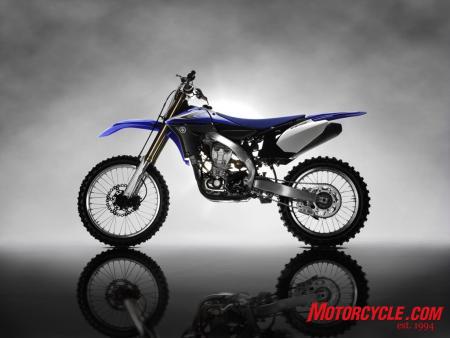 The 2010 YZ450F motor looks forward by turning around backward. |
Slanting the cylinder rearward also opens up a straighter pathway for the intake charge at the front of the bike, now using an air filter near the steering head – no longer will a rear wheel fling dirt in and around a traditionally placed intake behind the engine. Further mass-centralizing efforts were made by placing the 1.6-gallon fuel cell under the seat, which is thoughtfully opaque to enable fuel-level checks at a glance.
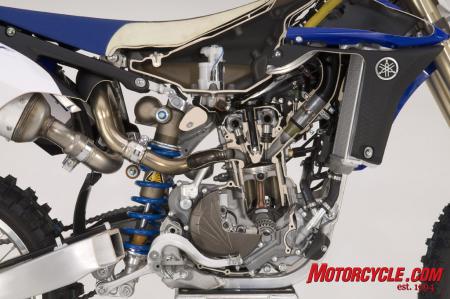 What’s new? A reversed engine, underseat fuel tank, tornado exhaust, titanium valves and fuel injection. Only the wheels and brakes are carry-over items from '09. |
Squirting fuel is now the responsibility of a 44mm Keihin throttle-body injection, using a modern 12-hole injector for best atomization. Throw away those old jet-kit pieces, because this electronic system can be electronically fine-tuned with a GYTR Power Tuner (about $250). This self-powered hand-held unit doesn’t require a laptop to build custom maps (for fuel and ignition timing) to suit the rider and track conditions.
A larger bore and correspondingly smaller stroke contribute to a slightly shorter engine height and greater revability. Theoretically clever, the cylinder is offset to the front of the crank center so that the combustion stroke transfers its power directly down (vertically) the cylinder. We can’t yet vouch for the efficacy of the tornado exhaust, but it sure looks cool!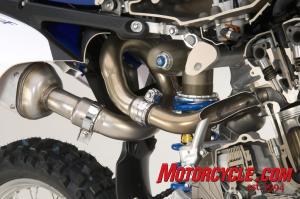
Four titanium valves control flow in and out, as the mill’s valve count is reduced by one from Yamaha’s unique 5-valve layout that is now out of fashion. Spent gasses exit from the rear of the engine and into a “tornado-style” header that loops around itself to provide for sufficient length before entering the large muffler. Again, Yamaha claims improved mass centralization.
The relocation of the airbox not only freed up room for the tornado exhaust, it also allowed the shock to be placed directly over the central axis of the frame “to optimize linear rigidity performance.” The shock’s piggyback reservoir is larger and placed atop the damper instead of alongside it where it can be heated by exhaust pipes.
Aluminum frame is gorgeous. Note the S bend in profile and from the top. 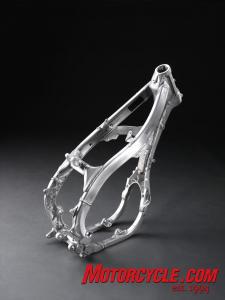
Also new is the sharper bodywork similar to the new YZ250F, with black sections of plastic in wear areas around the knee and boot sections to better hide inevitable scuffing. An almost completely flat seat allows generous fore and aft rider movement, especially important in corners when trying to load the front tire. A marginal change in triple-clamp offset is said to improve maneuverability, and the Pro Taper handlebar retains its four-position adjustability.
The YZ450F will be available in two colors: Team Yamaha blue and white; or white with red accents and black wheels. Yamaha hasn’t yet released the YZ’s MSRP, but it promises the bike will arrive at dealers in December. By that time, there will be 50 GYTR accessories available, everything from ported cylinder heads to skid plates.
This all sounds like a great leap forward and makes for an intriguing press kit, but we’re curious to know if it actually works as well as advertised. We’ll find out later this month when we take it for a thorough thrashing. Stay tuned!
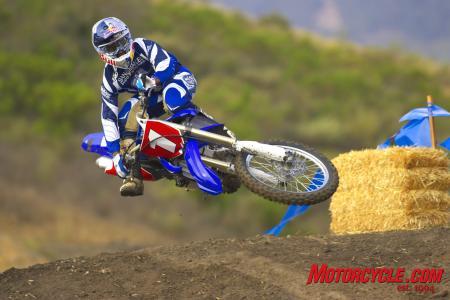 Supercross phenom James Stewart doin’ the Bubba Scrub on the 2010 YZ450F. |
Ring-dinging (still) Lives!
While most manufacturers are phasing out full-size 2-stroke motocross bikes, Yamaha is keeping its YZ125 and YZ250 in production for those who still value the lightness and simplicity of two-cycle powerplants. Among major OEMs only Yamaha and KTM still provide that option.

No comments:
Post a Comment